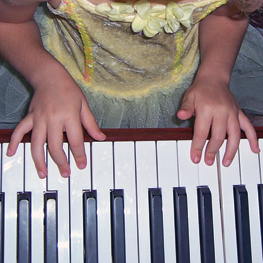
Many parents in the Calgary area naturally turn to sports as the first option when lining up after-school activities for their children. However, always putting the arts on the backburner may be a mistake, especially for children that are in the early years of preschool through elementary. Music instruction, in particular, is something that parents may want to explore a bit more. Even if a child is not musically inclined, many benefits are gained from a brief introduction to the fundamentals of either voice training or learning to play a simple musical instrument.
Increasingly, researchers are finding that just a short period of instruction in music can have lasting positive effects that can change a child forever. Last year, researchers at Northwestern University conducted studies showing that those who were exposed to even a small amount of music education in early childhood showed significantly better responses to sound all the way through middle age. Even if those children did not continue to play the instrument afterward and participated in no musical activity as adults, the benefits still remained as part of their overall brain function.
In an article written by Katie Moisse for ABC News, Nina Kraus, Director for the Auditory Neuroscience Lab at Northwestern, is quoted as saying:
“We know from previous studies that if you have a robust response to sound, you’re generally a better learner… you’re better able to hear conversations in noisy places, your reading ability tends to be better and your auditory memory seems to benefit. Those skills are important.”
In other words, the ‘take-home’ message from this study is that a small bit of music instruction in early childhood can lead to a better grasp of sound… and this appreciation for sound can make your child’s brain stronger into adulthood. These surprising results show that investing a little time in early music exposure is something that can later pay great dividends.
Cecilia Myhres, Director of the Myhres School of Music, describes her results in teaching a three-year-old who was virtually non-verbal when he began lessons. Myhres says that after several semesters, he “was forming complete sentences and was able to communicate with his grandparents.”
As a music instructor, Myhres is well aware that the work she does is not simply fun; it is serious business in making kids better thinkers as well as more capable of understanding and relating to other people.
“Researchers have found that the effect of music on the brain improves cognitive development, verbal skills and emotional intelligence,” says Myhres.
Even in Myhres’ hometown - where most extra-curricular activities centre primarily on sports - most all young children will willingly grab onto music training and find it enjoyable and rewarding.
There are other reasons for older children to consider musical training as well, even though the critical period of early childhood may have already passed.
“Every day we see shy, introvert young adults walk in and progress into confident, outgoing musicians. It’s a joy to watch the progress and how music does give them that vehicle for self-expression,” says Myhres.
In preparation for the beginning of a new school year, many parents are selecting extra-curricular programs for their children, and there are many out there to choose from. Parents may wonder: ‘What if my child is not musically inclined?’ Well, most researchers agree that any child can experience learning, as well as joy, from taking on a music program of any sort.
“I believe that all children are musical and can achieve basic music competence,” says Myhres. “Just as young children have the innate ability to learn the language of their environment, they can also learn music… I would suggest to parents that say their child is not musically inclined: Please do your own research. Try music and give them the benefit.”
When you introduce your child to music, you not only create lasting memories, but you begin to build a skill set that they can proudly share with others. And if recent studies are correct, those few months or years in a music studio may pay dividends in increased brain power for a lifetime.
Kara is a freelance writer and editor of two editions of a parenting magazine. She enjoys making music with her kids, aged 10 and 13. She also loved visiting music stores with them; she always had to keep them away from the drums.
Calgary’s Child Magazine © 2024 Calgary’s Child